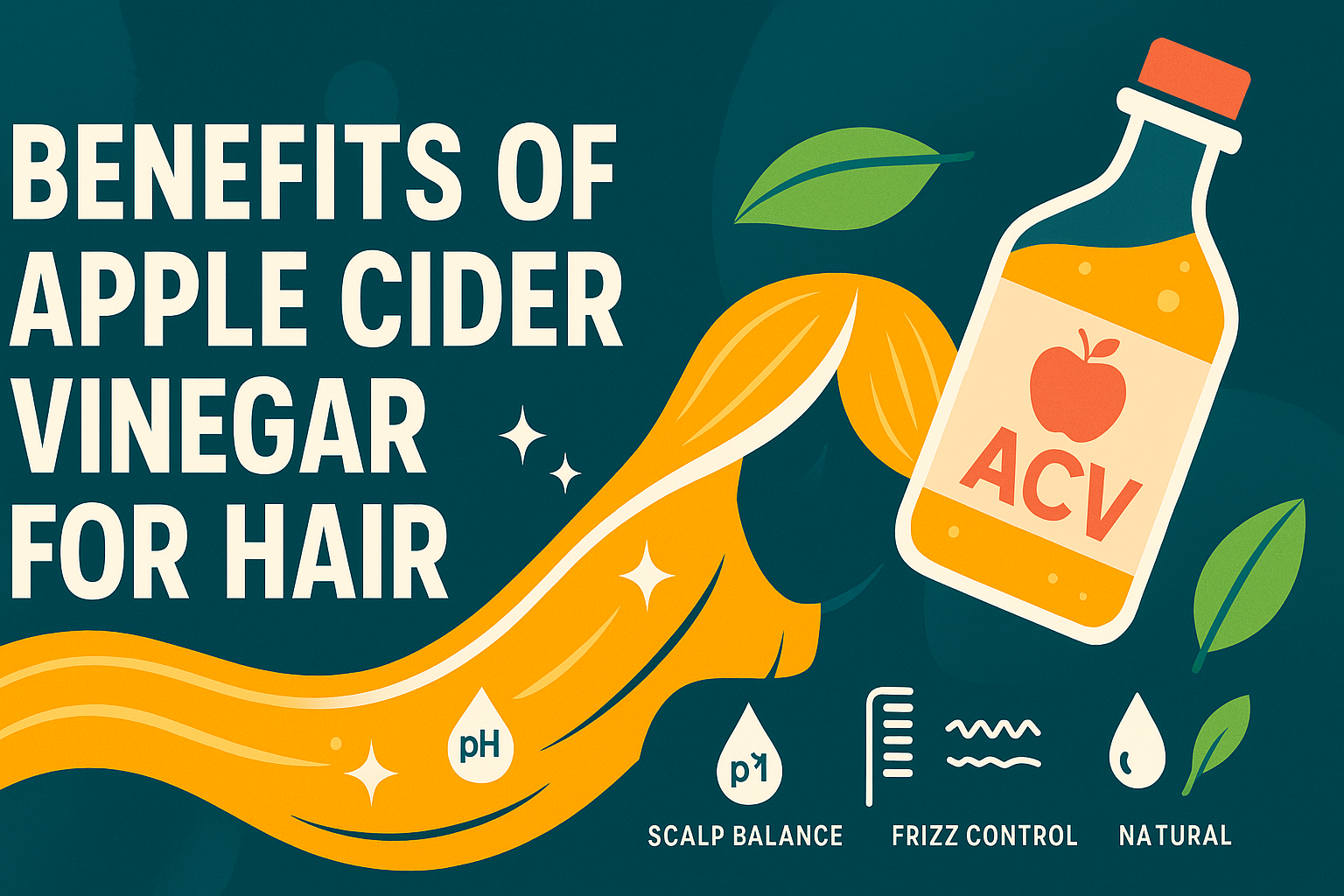You know that frustrating feeling when your hair won’t shine, your scalp itches like crazy, or every product you try just builds up? I’ve been there.
Here’s the thing: apple cider vinegar sitting in your kitchen right now can balance your hair pH, boost shine, and fight product buildup without fancy salon treatments. This simple pantry staple has 9 big wins for your hair and scalp that work fast.
Stick around, because I’m going to share exactly how this vinegar trick can transform your hair care routine!
Key Takeaways
Apple cider vinegar, with a pH of 2-3, restores hair and scalp pH balance to their healthy range (hair: 3.7; scalp: 4.5-5.5), preventing dryness and breakage.
ACV’s acetic acid dissolves product buildup, hard water minerals, and oil without harsh chemicals, providing noticeable shine improvement after just two monthly rinses.
Studies like Yagnik (2018) confirm apple cider vinegar’s antibacterial and antifungal properties, making it effective for dandruff control and reducing itchy or flaky scalps.
Regular diluted ACV rinses seal the hair cuticle, minimize frizz by locking in moisture, enhance vibrancy for all hair types—even color-treated or curly—and promote easier detangling.
Professionals recommend mixing 1.5 tablespoons unfiltered ACV with 8 ounces of water to avoid irritation; always rinse thoroughly after use to prevent lingering odor or dryness.
Table of Contents
Benefits of Apple Cider Vinegar for Hair
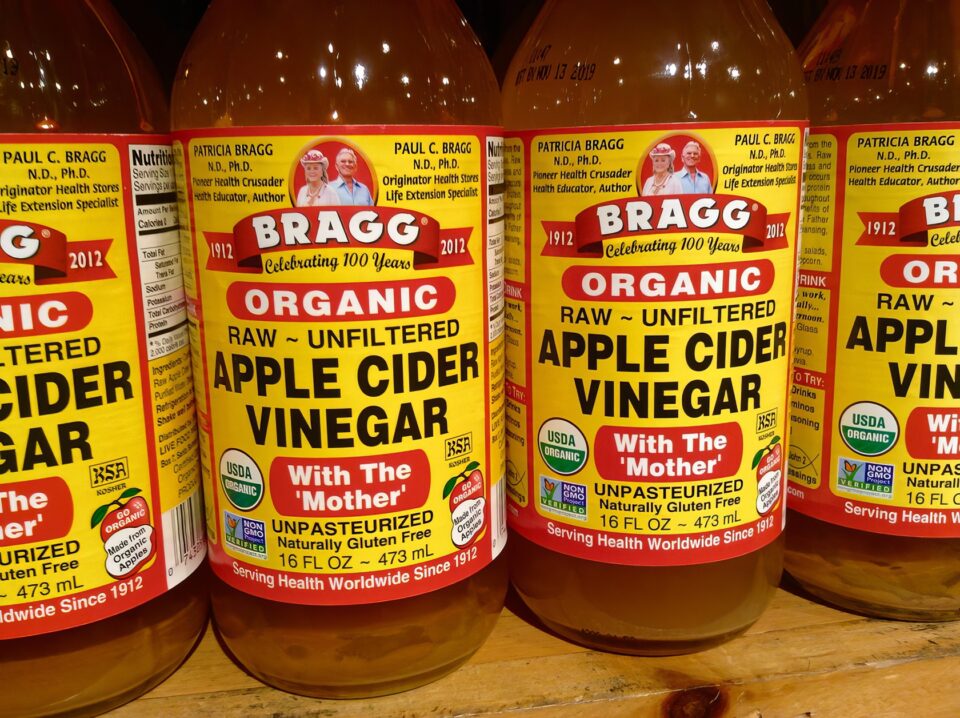
Apple cider vinegar brings out hair shine and helps keep each strand looking fresh. Get ready to discover how this natural hair care staple makes your locks happier from root to tip.
How does apple cider vinegar balance hair pH levels?
Hair’s natural pH sits at 3.7, but many shampoos raise it higher, causing dryness and breakage. Apple cider vinegar, with a pH between 2 and 3, works to bring the hair’s pH balance back into its comfort zone.
You get smoother cuticles and fewer tangles as those tiny scales on your strands start to lay flat again. According to a 2024 study reviewed by the Wimpole Clinic, ACV’s low pH may help flatten the hair cuticle, making it appear smoother and shinier. The study also showed that almost 40% of 123 tested shampoo brands had a pH over 5, which can push your hair into the alkaline zone and cause damage.
“Shinier hair starts with healthy acid levels.”
Sulfate-free shampoo lovers sometimes notice their shine fading over time due to hard water or too much product use. A simple rinse using apple cider vinegar after shampooing can help keep that scalp pH balance in check while boosting glossiness overnight. Smoother cuticles reflect light better, making dull locks look lively instead of lackluster.
How does apple cider vinegar clarify and remove buildup?
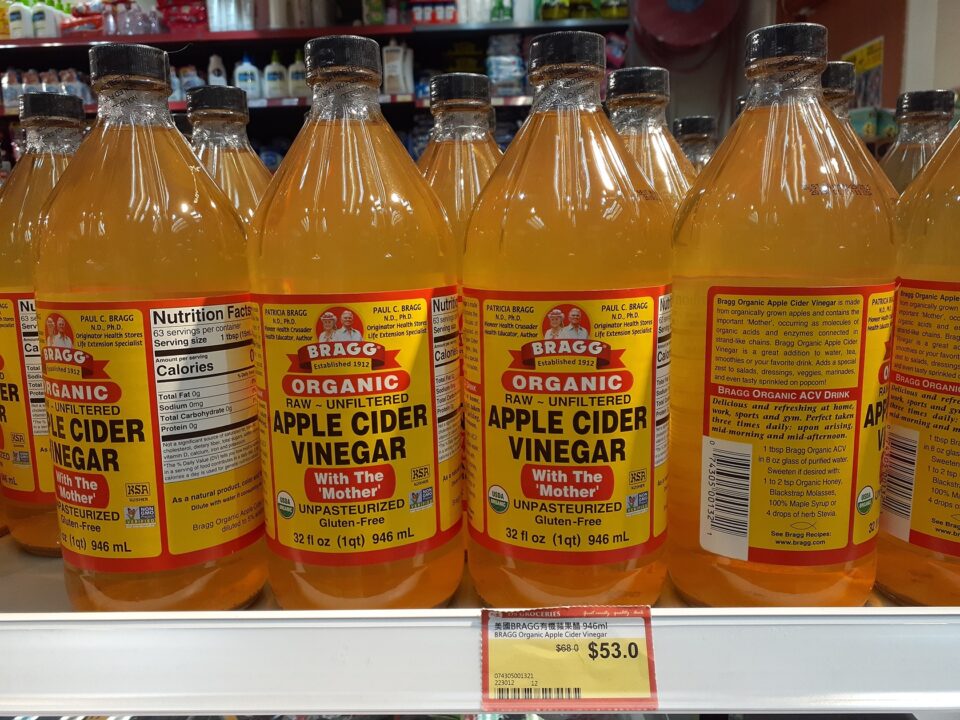
This natural pH-balancer does more than help with acidity. It works as a powerhouse clarifier, tackling buildup from hair products and hard water like a champ.
Acetic acid in apple cider vinegar cuts through residue left by gels, sprays, and dry shampoo that can weigh down strands. If your city pumps out mineral-heavy water, those pesky deposits of calcium and magnesium cling to hair shafts. Apple cider vinegar dissolves them easily.
Many women using lots of styling products struggle with limp or greasy locks even after shampooing. A simple rinse—half a tablespoon of organic ACV in eight ounces of water—removes stubborn dirt, oil, grease, and product gunk without harsh chemicals found in typical dandruff shampoos or cleansers.
Those hazy minerals disappear, as does much itchiness from clogged follicles or leftover conditioner. After switching to this clarifying method twice a month myself on my long curly mane, I noticed far less scalp irritation and dullness almost overnight!
The “mother” floating at the bottom of unfiltered ACV adds probiotics that nourish while cleaning. Popular brands like Bragg Organic Apple Cider Vinegar are still the go-to choice for many natural hair enthusiasts. This raw, unfiltered option is available everywhere from Amazon to Whole Foods and retains the beneficial enzymes and bacteria that make ACV so effective.
While it’s a game-changer for voluminous styles, it’s equally versatile for guys—think practical haircuts for balding men that benefit from a clean, residue-free scalp to enhance texture and reduce flakiness. No matter your hair type, incorporating ACV can elevate your routine without the fuss.
How does apple cider vinegar seal the hair cuticle?
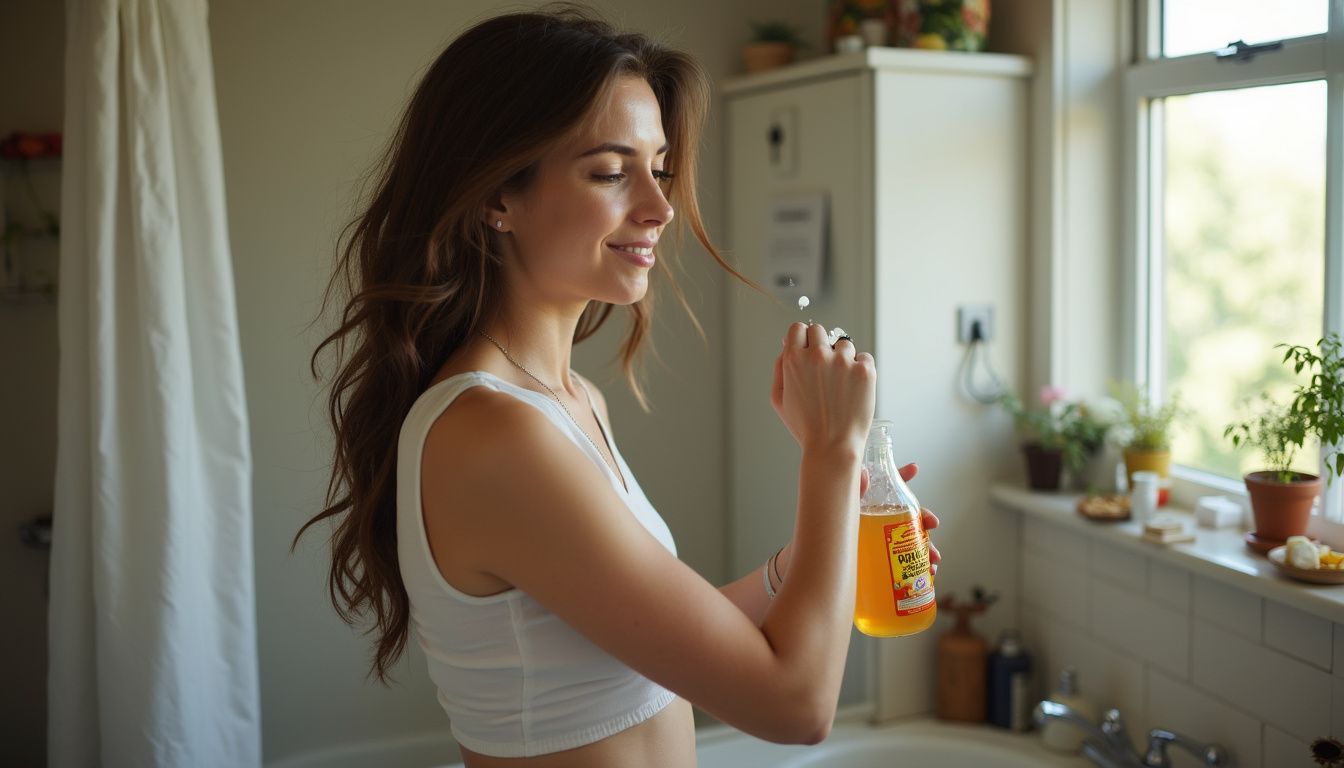
Apple cider vinegar makes the hair cuticle lay flat. Its acidity helps flatten and tighten the cuticle, so your hair stays smoother and holds onto moisture better.
Smoother strands reflect light more easily, which means your locks look shinier and more vibrant. Sealing the cuticle also leaves less room for bacteria to settle in or irritants to sneak through, a win for anyone with a sensitive scalp or issues like seborrheic dermatitis.
Curly, color-treated, dry, or damaged hair often feels rough because of raised cuticles. After an apple cider vinegar rinse, those lifted edges close up. Frizz runs away, tangles loosen up fast, and detangling becomes way less of a battle.
Cleaner strands grab onto conditioning treatments better after you clarify buildup with apple cider vinegar first. According to hairstylist Bobby Michael, co-owner of Manhattan’s Maverick House salon, when acid is put on hair, it closes your cuticles, which gives you that sleek, shiny finish you see at salons.
How can apple cider vinegar enhance shine and vibrancy?
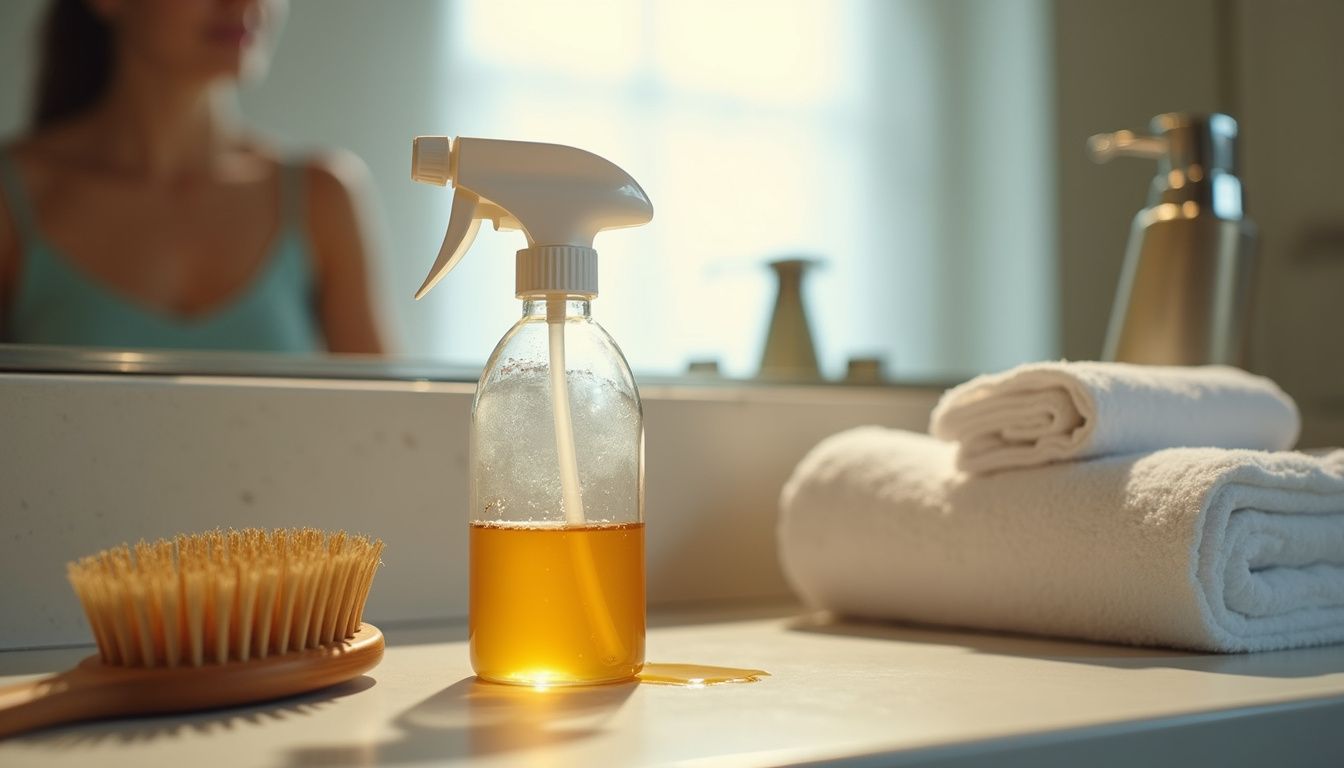
Sealing the hair cuticle keeps strands smooth, so what about bringing out even more glow and vitality?
That’s where apple cider vinegar steps in with its clarifying power. Its acidic nature lowers the pH of your hair, making each strand lie flat like a well-ironed sheet. This surface allows light to bounce off, giving your locks that head-turning shimmer.
ACV clears away residue from styling products and hard water deposits faster than you can say “bad hair day.” After my first rinse last summer, my dull waves sprang to life and shone brighter under sunlight—no filter needed!
Regular weekly rinses for oily or normal types, or every two weeks if your scalp leans dry or sensitive, keep buildup at bay while supporting vibrant color. As one stylist told me, “Healthy shine starts with a healthy foundation—clean roots and closed cuticles.”
Whether caring for natural curls or safeguarding colored strands against fading, this simple food-turned-hair hack offers real shine without extra cost or harsh chemicals. An Amazon reviewer of the popular R+Co ACV Cleansing Rinse raved that her coworkers compliment her bouncy, shiny hair every time she uses the product.
How does apple cider vinegar reduce frizz and tangles?

Apple cider vinegar smooths the hair cuticle, so each strand lies flat and locks in moisture. This reduces frizz and keeps your hair from puffing up, even on humid days.
A healthy cuticle also means fewer tangles after washing or brushing. Spraying diluted apple cider vinegar onto wet hair makes it easy to comb through, especially if you struggle with knots from dry scalps or damaged ends.
Improved elasticity helps curls bounce back instead of snapping, which stops breakage before it starts. Using this simple kitchen staple as a natural detangler saves time and stress on busy mornings.
Many women find their favorite products work better too because apple cider vinegar removes buildup without stripping color or drying out strands. Some people recommend trying long haircut styles for guys to show off those shiny results.
Benefits of Apple Cider Vinegar for Scalp
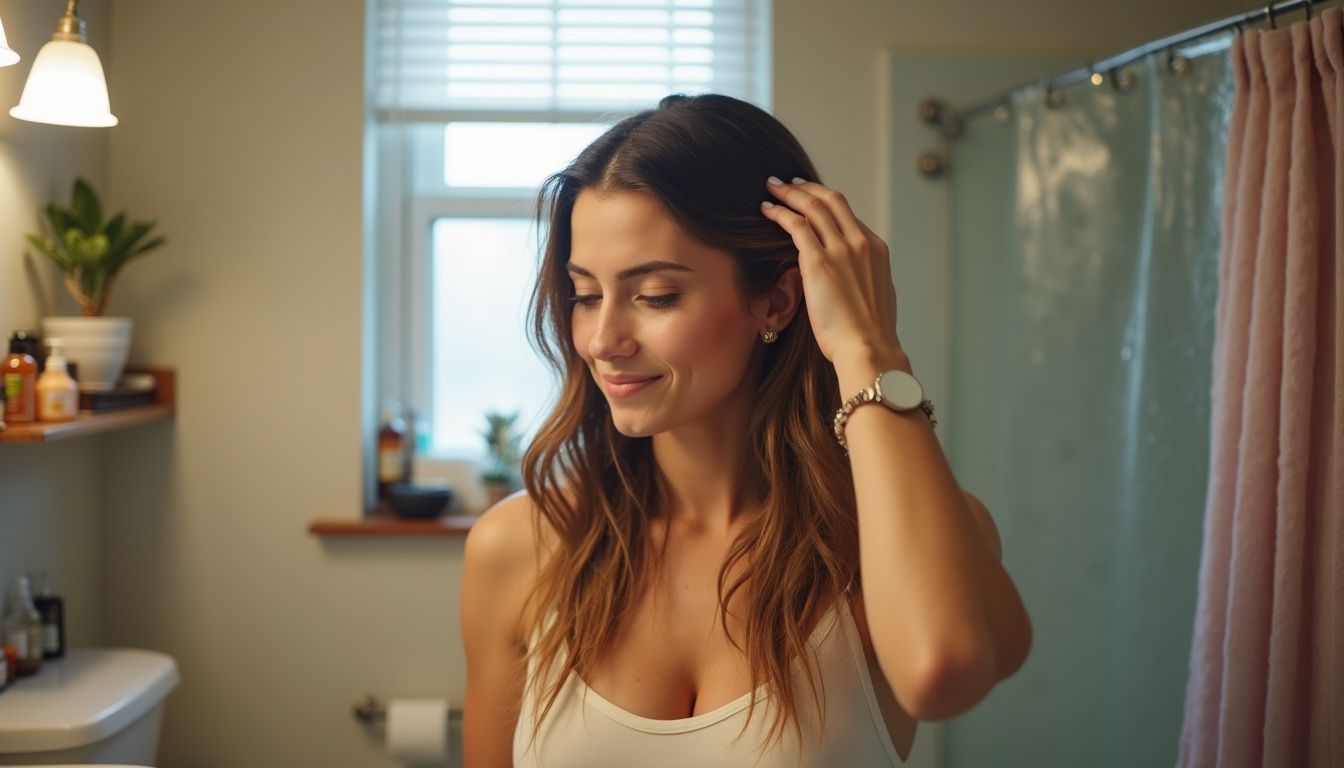
Apple cider vinegar has powerful antimicrobial properties that make it tough on scalp troubles like fungal infection and head lice. Its anti-inflammatory effects can calm redness, soothe sores, and help with cradle cap without irritating sensitive skin.
How does apple cider vinegar maintain scalp pH balance?
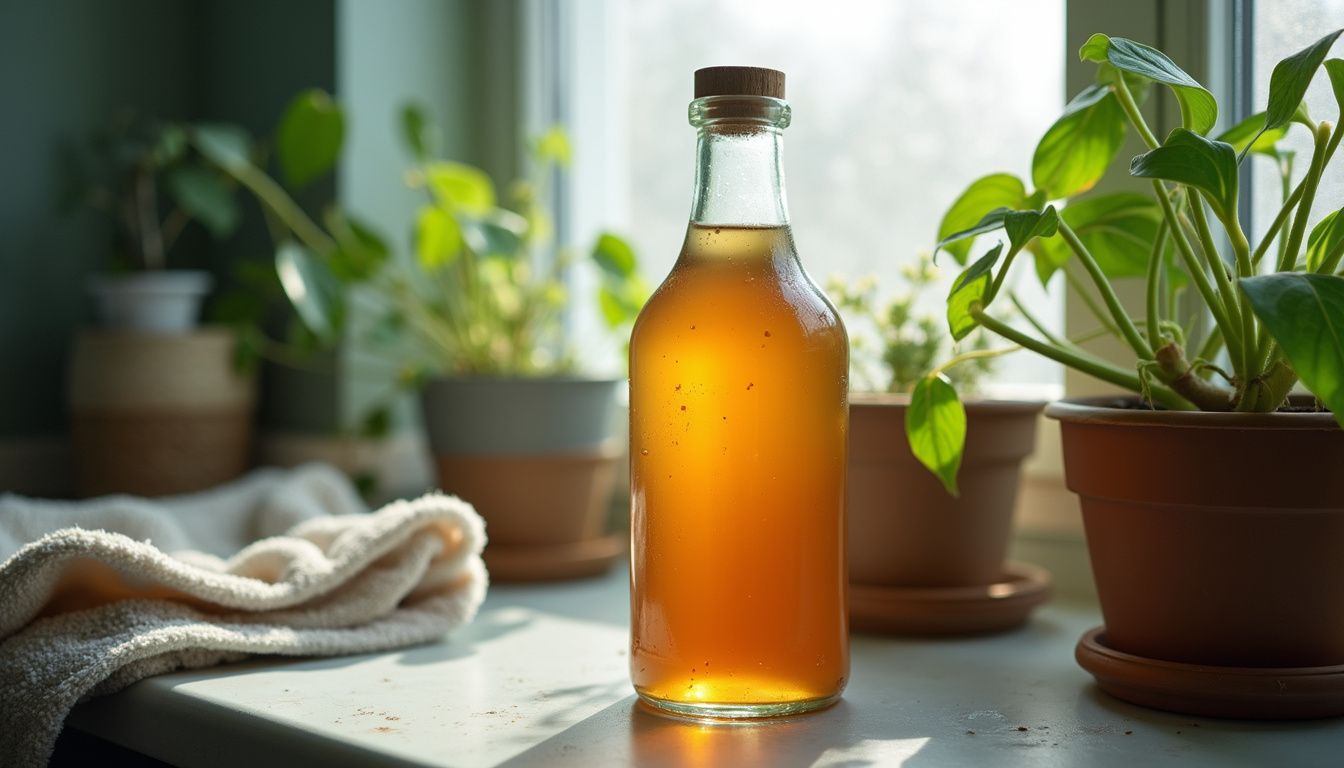
With a pH between 2 and 3, apple cider vinegar helps keep the scalp’s natural acidity balanced within its sweet spot of 4.5 to 5.5.
This balance prevents dryness, irritation, and flare-ups for any lady battling flaky skin or itchiness on her crown. A healthy pH supports normal hair growth and keeps those pesky follicles from getting clogged up with dead skin cells or styling gunk.
My own scalp felt less itchy after a week using an ACV rinse twice. My stylist noticed fewer flakes too! As my grandma used to say, “If it smells strong but works wonders, use it.”
By clarifying residue without harsh chemicals, this liquid lifts buildup while its antimicrobial properties ward off fungal infection that can mess with your mane.
Balanced pH equals happy roots.
What antibacterial and antifungal properties does apple cider vinegar have?
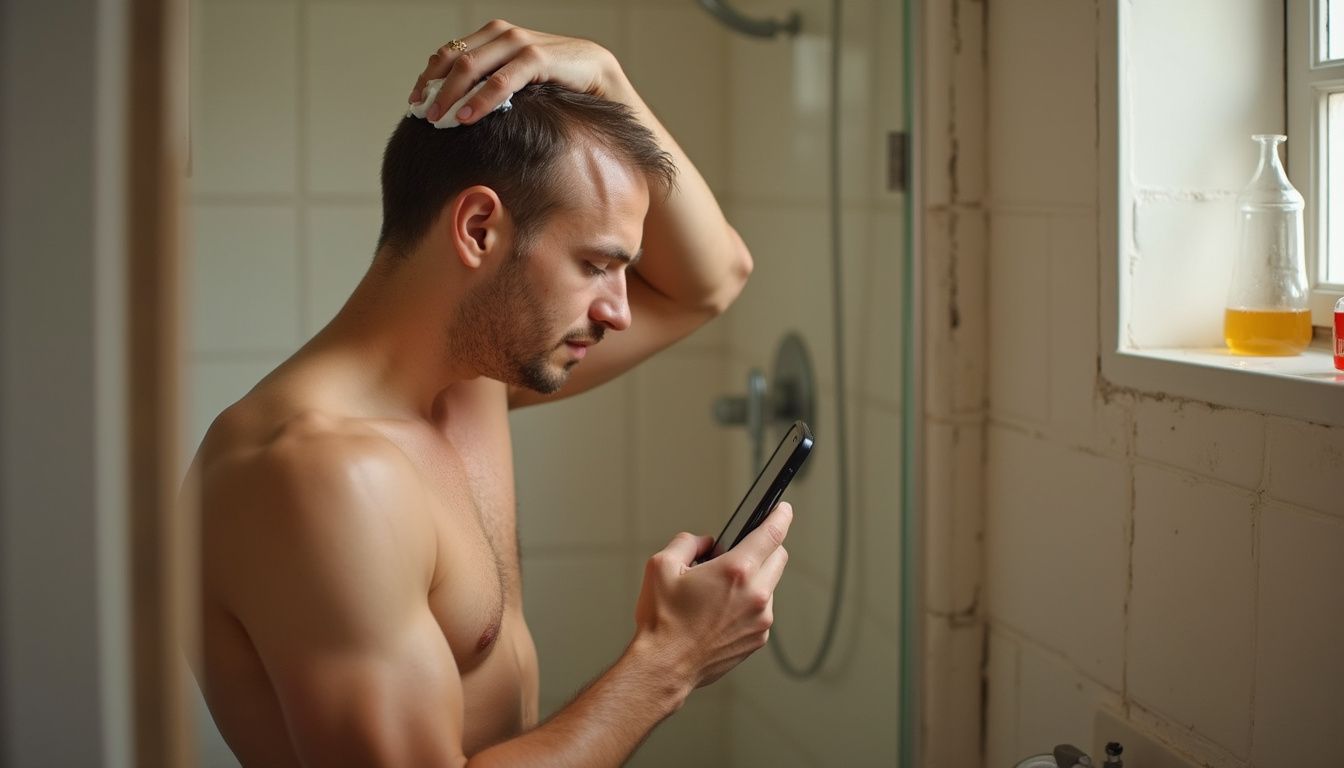
Apple cider vinegar contains acetic acid, which gives it strong antimicrobial powers.
In a 2018 study, researchers like Yagnik showed ACV can target bacteria and fungi that often trouble the scalp. During a bad case of ringworm as a teen, I used diluted apple cider vinegar dabbed on with a cotton ball. It felt tingly but helped calm my skin.
Many women see results fast when using ACV for issues like itchy patches or minor scalp infections. ACV’s antibacterial properties help keep pores clear by fighting off bacteria and allergens that build up from styling products or sweat.
Its antifungal effects make it tough for dandruff-causing yeast to thrive on your scalp or hairline. For stubborn spots such as lice or fungal rashes, you can tap diluted ACV onto the area using fresh cotton balls each time and wash all fabrics to cut back risk of spreading germs at home or in salons.
A 2021 review found that rinsing with vinegar for 20 to 30 minutes may have antimicrobial benefits, while 3-minute hair soaks were beneficial for getting rid of nits.
How does apple cider vinegar help combat dandruff and flakiness?
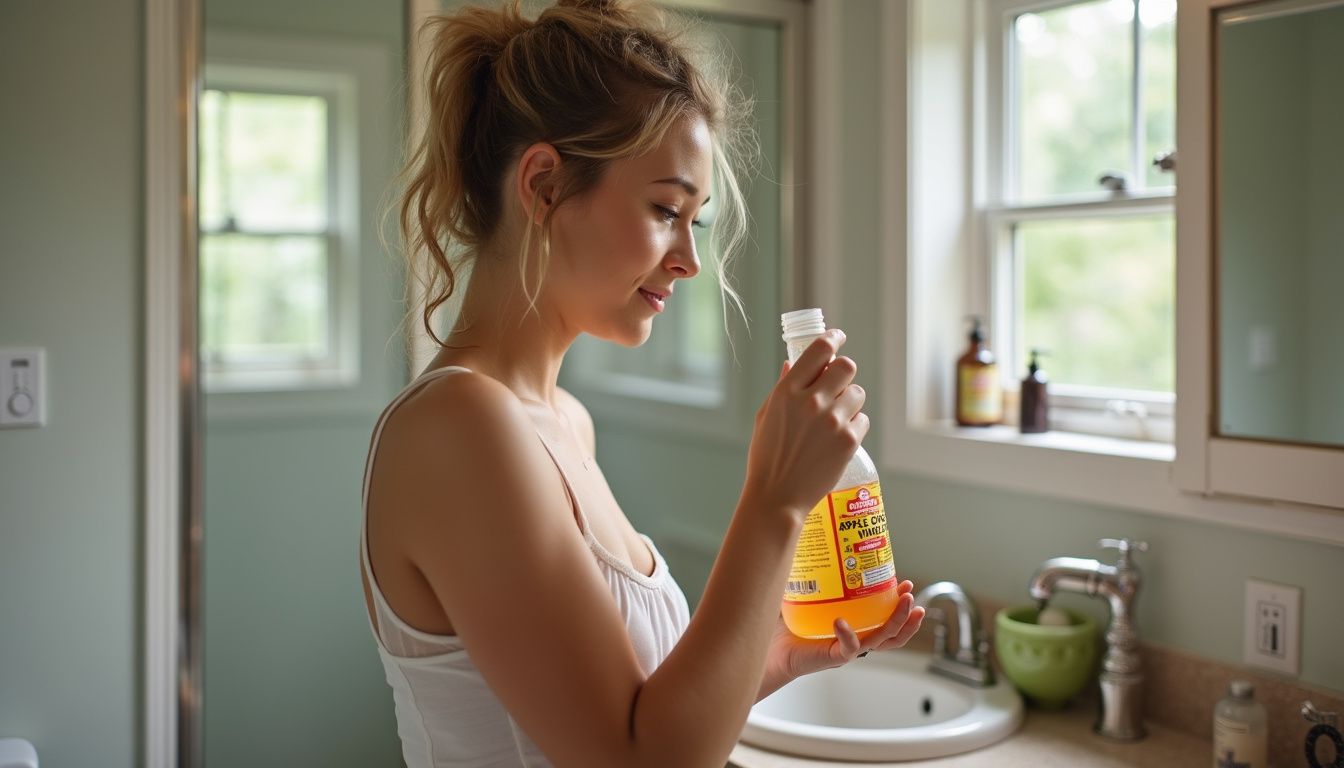
ACV acts like a scalp exfoliant. It helps shed dead skin cells that cause visible flakes.
The acidic pH may stop too much yeast and bacteria from growing, which makes an itchy head worse. After I used an ACV rinse during winter, my flaky patches near the hairline went away after three washes.
With disinfectant properties, this common pantry item targets certain problem-causing bacteria. A 2022 review even notes that it might ease scalp dryness that often mimics dandruff symptoms.
For cradle cap on little ones, parents use one part ACV to two parts water and leave it on for fifteen minutes before rinsing out thoroughly but never getting near the eyes. Even if you color your hair or deal with alopecia, a patch test is smart before trying any new supplement or treatment on delicate skin or thinning spots.
According to dermatologist Dr. Mona Gohara at Yale School of Medicine, apple cider vinegar has natural antibacterial and antifungal properties, which makes it pretty effective in killing and preventing dandruff-causing yeast on the scalp. One user reported that their dandruff lessened by 70 percent after regular ACV use.
How can apple cider vinegar relieve itchy scalp and irritation?
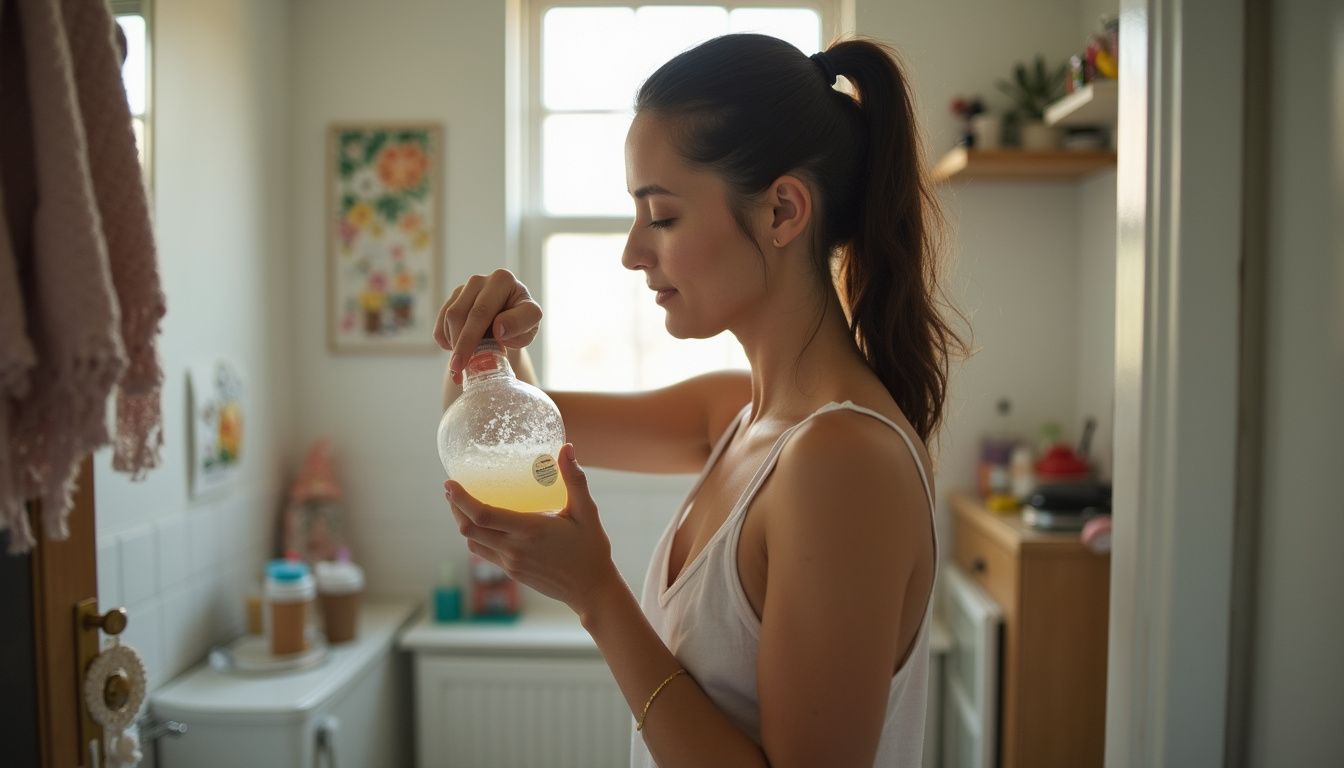
Apple cider vinegar stops scalp itching fast. Its alpha hydroxy acids exfoliate, sweeping away dry flakes and buildup that clog follicles or cause small bumps.
I used a diluted ACV rinse last winter after my scalp felt drier than old hay. Relief showed up in minutes and stuck around for more than a day.
The mixture also fights germs thanks to antibacterial power, tackling irritation from bacteria or dandruff all at once. Doctors have noted its anti-inflammatory properties can calm redness too.
Mixing one part apple cider vinegar with three parts warm water does the trick without fussing about allergic reaction. Just try a little on your wrist first as a skin patch test if you have sensitive skin.
This method lets nutrients work their way into hair roots, soothing itchiness while supporting healthy growth.
Every woman deserves an itch-free crown of glory, says trichologist Dr. Simone S., who swears by gentle rinses between minoxidil treatments.
Who Should Use Apple Cider Vinegar for Hair and Scalp

Got hair color worries, thinning spots, frizz monsters, or a scalp that throws snowstorms? You may spot yourself in this section—read on to see who grabs the most wins from apple cider vinegar!
Should people with fine or limp hair use apple cider vinegar?

Apple cider vinegar works like a clarifying toner for fine or limp hair.
After using it on my thin, flat locks once a week, I noticed more shine and less dull buildup from fat burners, supplements, and styling sprays. ACV helps lift the roots so your strands look fuller and have real volume.
Even after hot summers or lots of pool days in 2023, my hair felt lighter and looked less oily. Hair thinning can make you feel self-conscious. Apple cider vinegar boosts scalp health thanks to vitamins A, B, C, D, E, and K found naturally in apples.
Always dilute it with water to protect sensitive skin. Undiluted ACV may sting or dry out your scalp fast. Women with hypersensitive scalps or certain skin conditions should skip this step.
If you want more ideas for volume solutions alongside frizz reduction tricks (or know someone needing haircuts for balding men), ACV deserves a spot in your weekly routine if your hair needs some bounce.
Is apple cider vinegar good for flaky or irritated scalps?
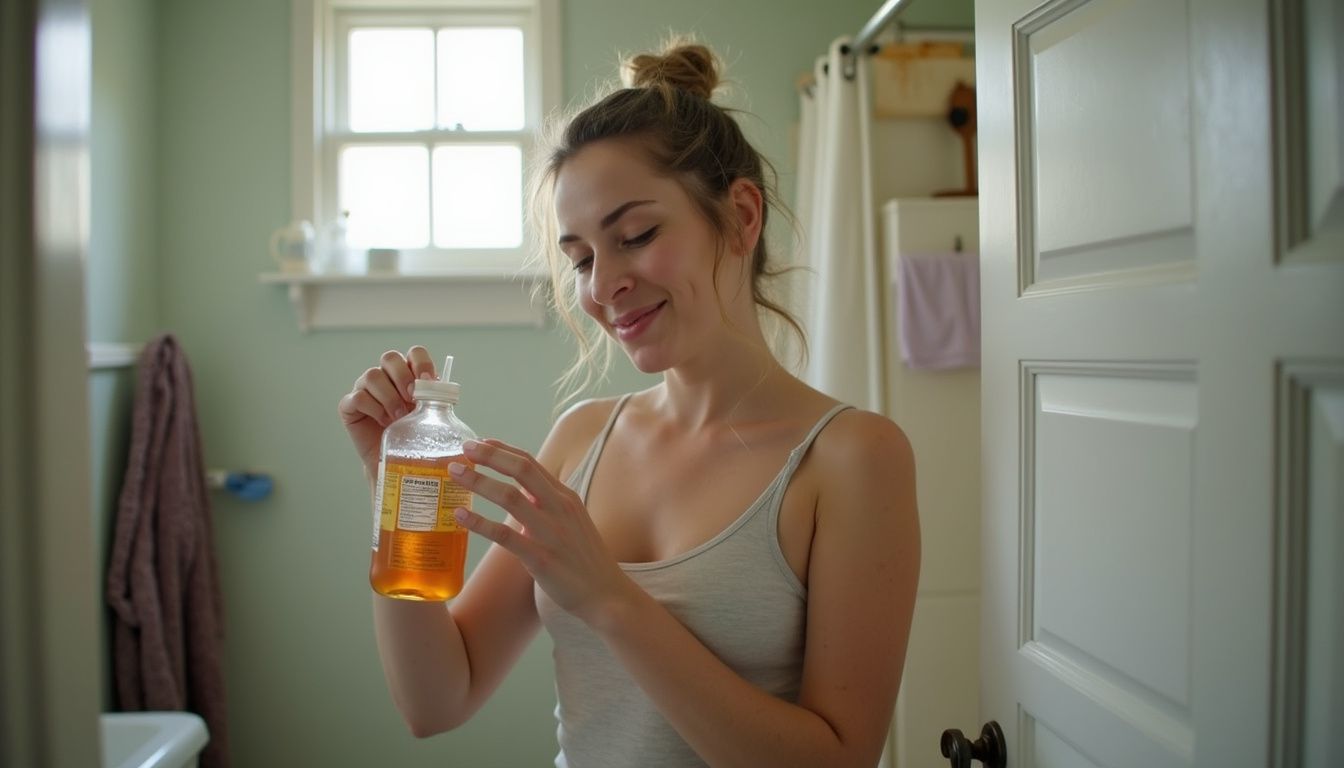
Fine or limp hair drinks up the light touch of apple cider vinegar, but flaky or irritated scalps may cheer even more.
Many women battle dry, itchy skin on their heads after coloring treatments or using heavy styling products. ACV helps keep your scalp’s pH levels right in the sweet spot, which protects against extra dryness and irritation.
Its antibacterial and antifungal properties target bacteria and fungi hiding under flakes. By gently exfoliating dead skin cells, it can lessen dandruff without stripping natural oils needed for hair conditioning.
Some people notice less itching right away after a rinse made from diluted apple juice vinegar. Using it one to two times a week often calms angry spots while helping manage flakiness linked to product buildup or hard water residue.
Even those with dyed hair enjoy its benefits since it does not strip color protection like harsher clarifiers might do. Products like SheaMoisture’s Apple Cider Vinegar Anti-Dandruff Pre-Wash, infused with Vitamin B3 and Salicylic Acid, gently exfoliate to remove flakes and detoxify the scalp without stripping essential moisture.
Can users of styling products or hard water benefit from apple cider vinegar?
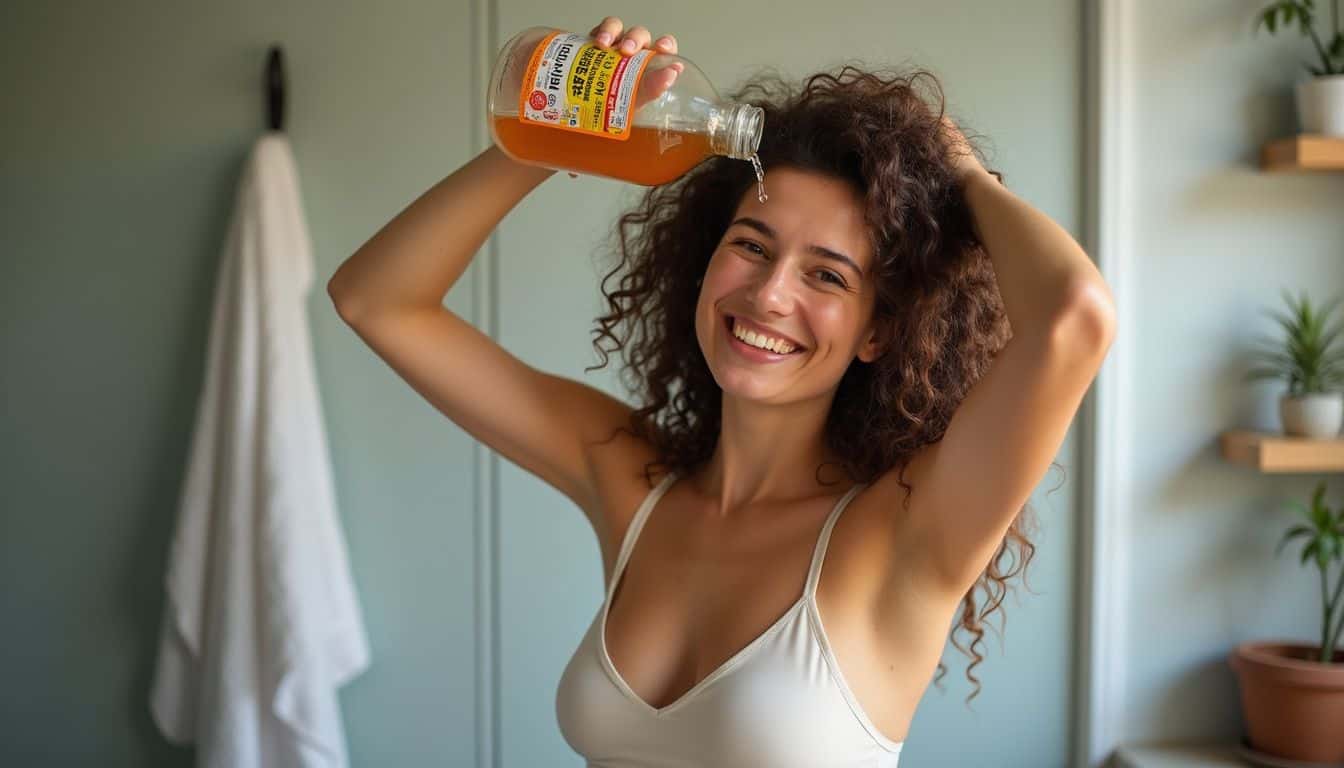
Hair weighed down by mousse, hairspray, or gels often looks flat and dull.
Apple cider vinegar steps in as a natural clarifier that dissolves product buildup with ease. My own scalp felt lighter after one rinse—like shaking confetti off an umbrella!
Hard water can leave minerals behind, making hair straw-like and flaky. ACV cuts through those stubborn deposits fast. Using half a tablespoon of apple cider vinegar in eight ounces of water removes residue from shampoos and conditioners too.
Many women with color-treated strands say their locks look brighter after switching to this rinse two times per month. ACV also helps exfoliate the scalp and relieve itchiness caused by mineral overload.
Results feel quick: volume comes back, tangles drop away, shine bounces into view. Ready-to-use products like GIRL+HAIR’s CLEAR+ Apple Cider Vinegar Hair Rinse are dermatologist-formulated and come with an easy-to-use applicator tip for direct scalp application.
Is apple cider vinegar suitable for curly or damaged hair?
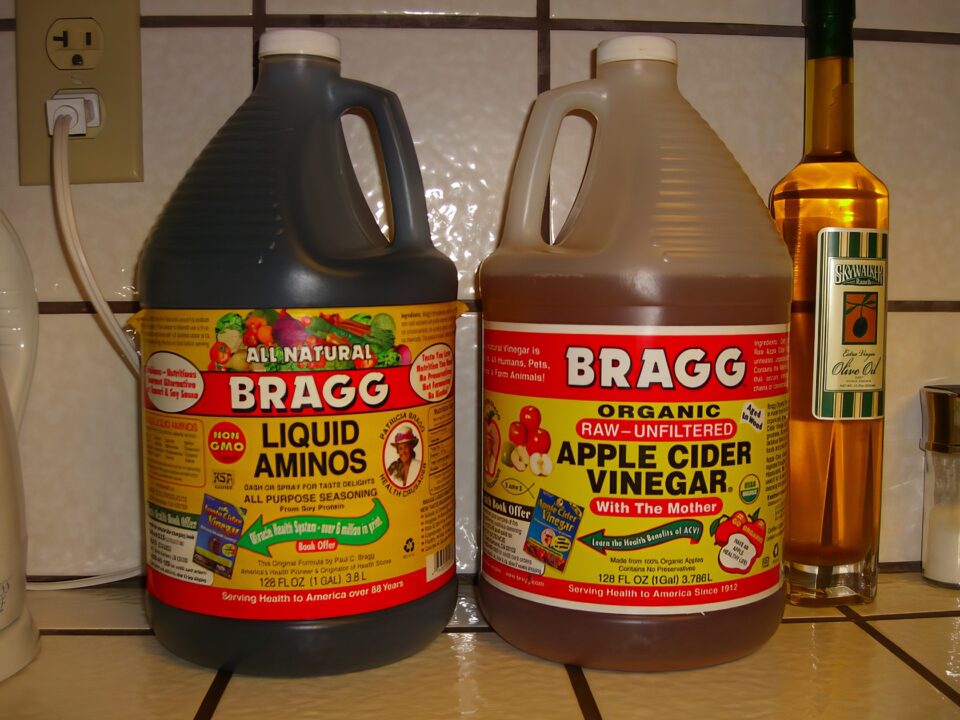
Curly or damaged hair often craves a little TLC.
Apple cider vinegar, especially the unfiltered type labeled “with mother,” helps revive curls that have gone flat. This simple rinse removes product buildup, softens each strand, and brings back lost bounce without stripping away moisture.
Women with curly hair spot shinier locks right after an apple cider vinegar rinse because it seals the cuticle and locks in vibrancy. For anyone struggling with breakage or dryness, dilute apple cider vinegar before using to prevent extra dryness.
Limit rinses to one or two times weekly for best results. Vitamins such as vitamin A, vitamin B, vitamin C, vitamin D, vitamin E, and vitamin K found in this natural remedy can give tired strands new life.
According to hair care enthusiasts on CurlyNikki.com, ACV is still a sacred staple in the natural hair community, praised for its ability to detox and add bounce to curls without the weight of conventional products.
How to Use Apple Cider Vinegar for Hair
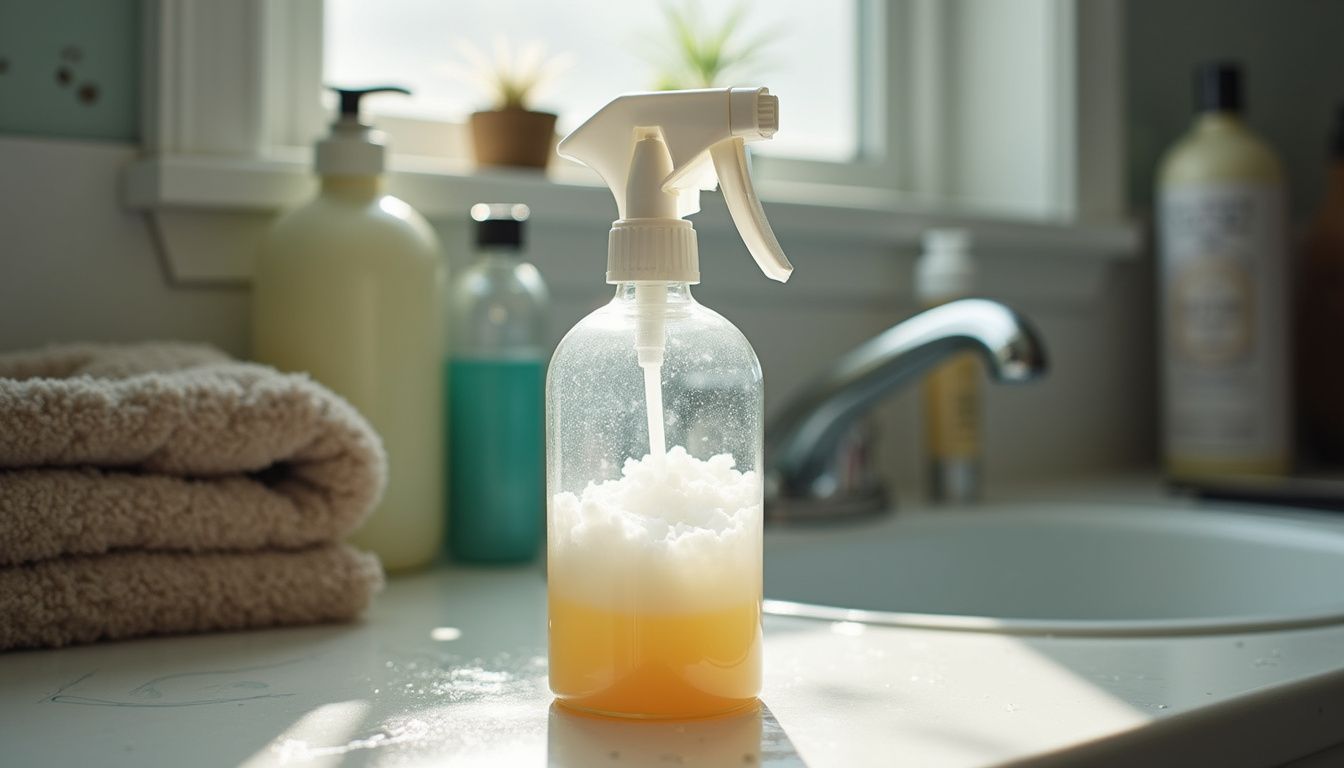
Using apple cider vinegar on your hair can upgrade shine and scalp health. Try different mixing methods to find what suits your hair color protection goals or targets frizz after styling products.
How should apple cider vinegar be diluted before use?

Combine apple cider vinegar with water before applying it to your hair or scalp.
Medical professionals and hair experts recommend against using undiluted ACV on your head, regardless of your desire for shiny hair. For regular use, select raw, unfiltered apple cider vinegar containing “mother.”
Mix 1.5 tablespoons (about 22 ml) with 8 ounces (237 ml) of water in a squeeze bottle or cup. Some people prefer using as little as half a tablespoon per cup if their skin feels sensitive after rinsing.
I discovered through experience that using more concentrated vinegar is not helpful. Undiluted vinegar causes discomfort and makes dry areas worse.
Always perform a patch test with your chosen mixture on a small area of skin—especially if you have color-treated hair or sensitive areas from previous skincare experiences. Adjust the ratio if your scalp feels too irritated, but always use plenty of water to maintain safe pH levels while preserving vibrant hair color and fighting residue from styling products or hard water minerals.
How can apple cider vinegar be used as a hair rinse or clarifying treatment?
Mix five parts water with one part apple cider vinegar for a gentle hair rinse.
Use a spray bottle to help spread the solution evenly over your scalp and hair after shampooing or conditioning. Pour the mixture slowly, avoiding your eyes, then massage it into your scalp for extra exfoliation.
Leave it on for 5 to 10 minutes before rinsing well with cool water. Many women use this clarifying treatment once weekly if their hair tends to get oily or weighed down by styling products and hard water minerals.
For dry or sensitive strands, treat yourself every two weeks instead of weekly. Some moms even use diluted apple cider vinegar on children’s scalps as a gentle fix for cradle cap. Leave it on for about 15 minutes before rinsing out thoroughly.
This method helps break up product residue while keeping pH levels in check, which can boost shine without stripping natural oils that prevent hair loss. Brands like Bragg’s Apple Cider Vinegar recommend mixing 1 part Bragg’s ACV with 5 parts water in a spray bottle or hair applicator for best results.
How do you massage apple cider vinegar into the scalp to promote circulation?
Spray a mix of equal parts apple cider vinegar and water onto your scalp using a spray bottle.
Use your fingertips, not nails, to massage the solution in gentle circles for one to two minutes. Pay extra attention to any areas that feel dry or tight. These need a little more love for better blood flow.
Let the ACV mixture sit on your scalp for a few minutes so it has time to exfoliate and boost circulation. Rinse well with lukewarm water after massaging.
This helps sweep away residue and buildup from styling products or hard water minerals. Regular use can make hair look livelier, especially if weight management is part of your self-care routine or you use meal replacement smoothies that sometimes affect hair texture over time.
Why is it important to rinse thoroughly after using apple cider vinegar?
After massaging apple cider vinegar into your scalp to boost circulation, the next step holds real weight.
Rinsing gets rid of any leftover vinegar that might stick around and cause an unpleasant smell. Experts agree that undiluted apple cider vinegar can irritate both your scalp and hair, so it’s vital to wash every bit out with cool water.
Leaving even a trace behind may trigger dryness or make irritation worse, especially if you use it often. Cool water helps close the hair cuticle and boosts shine too.
Never let the mixture sit on your head for longer than five to ten minutes before rinsing thoroughly. This cuts down any risk of issues. Always rinse well for happy strands—your nose and scalp will thank you later!
People Also Ask
How does apple cider vinegar exfoliate the scalp?
The alpha-hydroxy acids in apple cider vinegar, like malic acid, gently dissolve dead skin cells and product buildup to refresh your scalp.
Can apple cider vinegar remove buildup from styling products?
Yes, its natural acidity easily cuts through and removes residue from styling products like gels and dry shampoo. This clarifies your scalp without the harsh stripping effect of some shampoos.
Does apple cider vinegar help with dandruff?
It can definitely help by targeting the root cause. Apple cider vinegar has antifungal properties that help control the growth of Malassezia, a common yeast that contributes to dandruff.
How often should I use apple cider vinegar on my hair?
It’s best to start with a weekly rinse to see how your hair responds. Always dilute it, a good starting ratio is one part vinegar to five parts water, to avoid drying out your hair.
References
https://www.medicalnewstoday.com/articles/319396
https://www.healthline.com/health/apple-cider-vinegar-hair
https://www.hims.com/blog/apple-cider-vinegar-for-hair-loss
https://www.healthline.com/health/apple-cider-vinegar-dandruff (2024-09-23)
https://www.hims.com/blog/apple-cider-vinegar-dandruff
https://www.youtube.com/watch?v=0I1U0PeZIPQ
https://www.realsimple.com/beauty-fashion/hair/hair-care/apple-cider-vinegar-for-hair
https://health.unl.edu/apple-cider-vinegar-good-your-skin-and-hair/
https://www.verbenathesalon.com/blog/acv-how-to/
https://www.byrdie.com/apple-cider-vinegar-for-hair (2024-04-22)
